Posts Tagged ‘Burma Partnership’ (399 found)
Free and Fair Elections for Whom?
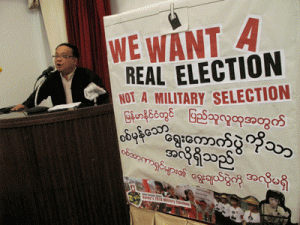 Last week, Burma’s Union Election Commission (UEC) declared that the General Elections would be set for 8 November of this year. Having previously boycotted the 2010 election on the grounds the election rules were unfair, the opposition National League for Democracy (NLD) has agreed to contest the military-backed Union Solidarity and Development Party (USDP), who currently holds power […]
Last week, Burma’s Union Election Commission (UEC) declared that the General Elections would be set for 8 November of this year. Having previously boycotted the 2010 election on the grounds the election rules were unfair, the opposition National League for Democracy (NLD) has agreed to contest the military-backed Union Solidarity and Development Party (USDP), who currently holds power […]
Burma – Where Classrooms are replaced with Jail Cells
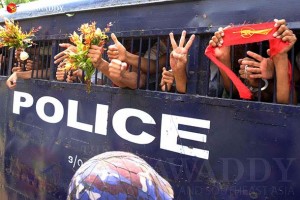 On 2 July 2015, five student protestors were charged under the controversial Peaceful Assembly and Procession Law for taking part in a protest concerning the overpowering influence of the Burma Army in Parliament. An additional four students were arrested after being involved in a graffiti protest on the campus of Yadanabon University in Mandalay. The demonstrations came as a result of the ongoing detention and subsequent unfair trials of students protesting the national education law along with the failure of Parliament to pass five out of six proposed amendments to the 2008 Constitution, most notably Article 436 […]
On 2 July 2015, five student protestors were charged under the controversial Peaceful Assembly and Procession Law for taking part in a protest concerning the overpowering influence of the Burma Army in Parliament. An additional four students were arrested after being involved in a graffiti protest on the campus of Yadanabon University in Mandalay. The demonstrations came as a result of the ongoing detention and subsequent unfair trials of students protesting the national education law along with the failure of Parliament to pass five out of six proposed amendments to the 2008 Constitution, most notably Article 436 […]
Constitutional Crackdown Brings A Dark Day for Democracy in Burma
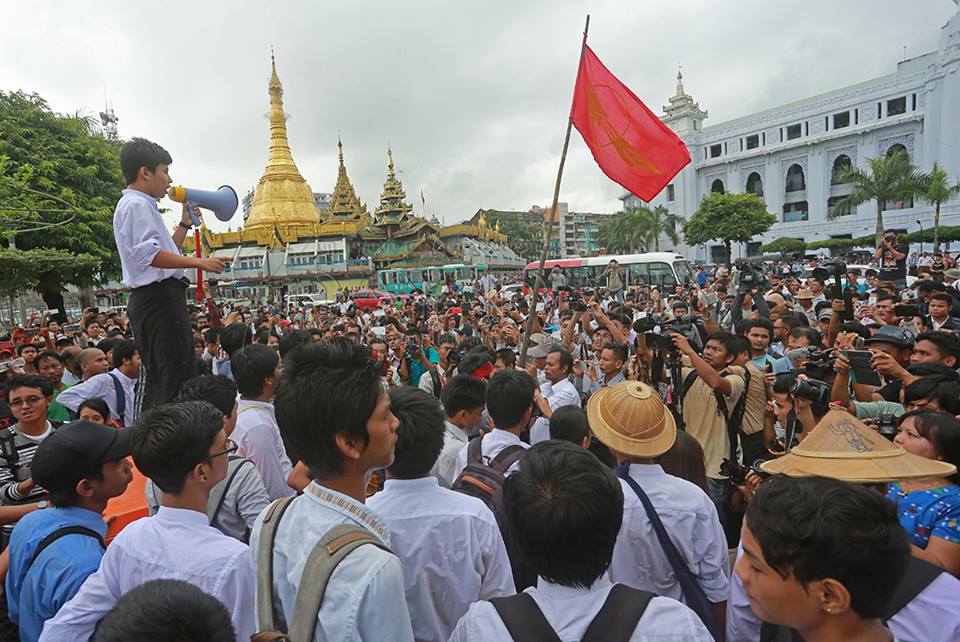 After an increasingly dispiriting start to 2015, and with landmark national elections now likely only five months away, Burma’s flimsy “reform process” is unraveling inexorably. First there was the 10 March crackdown on the nationwide student protest movement at Letpadan, Bago Region; then the Committee to Protect Journalists’ revealed that, despite much-heralded media reforms in 2011, Burma featured yet again in its 2015 rogues’ gallery of top 10 most censored countries on the planet; more recently, the refugee crisis, triggered mostly by severe state and religious persecution of the Rohingya and other Muslim minorities in Arakan State, caught the world’s attention. Meanwhile, grave human rights abuses – including sexual violence – continue unabated in ethnic conflict areas, especially in war-torn Kachin State, parts of northern Shan State and Arakan State, bringing the total number of IDPs in Burma to over 660,000.
After an increasingly dispiriting start to 2015, and with landmark national elections now likely only five months away, Burma’s flimsy “reform process” is unraveling inexorably. First there was the 10 March crackdown on the nationwide student protest movement at Letpadan, Bago Region; then the Committee to Protect Journalists’ revealed that, despite much-heralded media reforms in 2011, Burma featured yet again in its 2015 rogues’ gallery of top 10 most censored countries on the planet; more recently, the refugee crisis, triggered mostly by severe state and religious persecution of the Rohingya and other Muslim minorities in Arakan State, caught the world’s attention. Meanwhile, grave human rights abuses – including sexual violence – continue unabated in ethnic conflict areas, especially in war-torn Kachin State, parts of northern Shan State and Arakan State, bringing the total number of IDPs in Burma to over 660,000.
ဒုကၡသည္တို႔၏အသံ – ထိုင္း-ျမန္မာနယ္စပ္တေလွ်ာက္ရွိ ျမန္မာ့ဒုကၡသည္မ်ားအေျခအေန
(၂၀၁၅ ခုႏွစ္ ဇြန္လ ၁၀ရက္) ယေန႕တြင္ Burma Link ႏွင့္ ျမန္မာ့အေရးပူးေပါင္းေဆာင္ရြက္သူမ်ား တို႕မွ ဒုကၡသည္တို႔၏အသံ – ထိုင္း-ျမန္မာနယ္စပ္တေလွ်ာက္ရွိ ျမန္မာ့ဒုကၡသည္မ်ား အေျခအေန ဟုအမည္ရွိသည့္ စာတမ္း အက်ဥ္းတစ္ေစာင္ကို ျမန္မာဘာသာျဖင့္ အင္တာနက္စာမ်က္ႏွာေပၚသို႔ ပူးတြဲထုတ္ေ၀တင္ျပထားပါသည္။ ထိုစာတမ္း တြင္ ျမန္မာႏိုင္ငံ၏ ျပဳျပင္ေျပာင္းလဲေရး လုပ္ငန္းစဥ္ကာလအတြင္း ဒုကၡသည္တို႔၏အသံမ်ား ဆက္လက္လ်စ္လ်ဴရႈခံ ေနရဆဲျဖစ္သည္ကို အဓိကထား ေရးသားေဖာ္ျပထားပါသည္။ […]
• • •A Regional Solution to the Refugee Crisis Must Address Root Causes
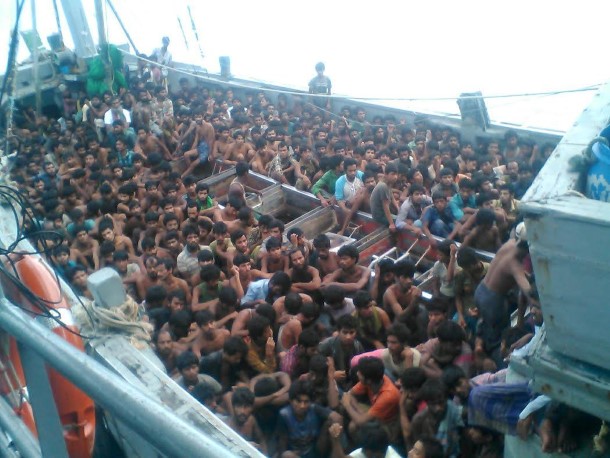 On 29 May 2015, Thailand hosted the long-awaited Special Meeting on Irregular Migration to address the unfolding refugee crisis in the Andaman Sea. The talks brought together representatives from 19 nations mainly in the ASEAN region, along with delegates from the UN High Commission for Refugees (UNHCR), UN Office on Drugs and Crime (UNODC), and the International Organization for Migration (IOM). At the time of the meeting, the Arakan Project has reported that at least 6,000 refugees, mainly Rohingya, are unaccounted for and likely stranded at sea. Victims of discrimination and denied even basic human rights back in Burma, these individuals are risking malnourishment, dehydration, and abuse in order to escape repressed lives under the Burma Government.
On 29 May 2015, Thailand hosted the long-awaited Special Meeting on Irregular Migration to address the unfolding refugee crisis in the Andaman Sea. The talks brought together representatives from 19 nations mainly in the ASEAN region, along with delegates from the UN High Commission for Refugees (UNHCR), UN Office on Drugs and Crime (UNODC), and the International Organization for Migration (IOM). At the time of the meeting, the Arakan Project has reported that at least 6,000 refugees, mainly Rohingya, are unaccounted for and likely stranded at sea. Victims of discrimination and denied even basic human rights back in Burma, these individuals are risking malnourishment, dehydration, and abuse in order to escape repressed lives under the Burma Government.
As more and more refugees are rescued from the squalid conditions at sea, survivor accounts have begun to emerge. Human Rights Watch recently published accounts that detail the dangerous journey from Burma, including stories involving traffickers intentionally abusing the refugees in order to hasten ransom demands, being forced at gunpoint into departing refugee boats, and the cramped and overcrowded conditions of the boats used to transport the refugees. A 16-year-old Rohingya girl described her experience on board the refugee boat, “When I got to the big boat … I cannot explain my feeling I was so scared. We were about 16 people in one small room. The doors were always locked. The smugglers put the food and water through a small hole, we never saw them.” […]
• • •Press Release: Burma Must Tackle Underlying Root Causes of Protests
(28 May 2015) The Burma Government should treat the underlying structural causes of the recent outbreak of protests in Burma rather than using violence against demonstrators, Burma Partnership said in a new briefing paper released today […]
• • •Human Rights at the Bottom of the Andaman Sea
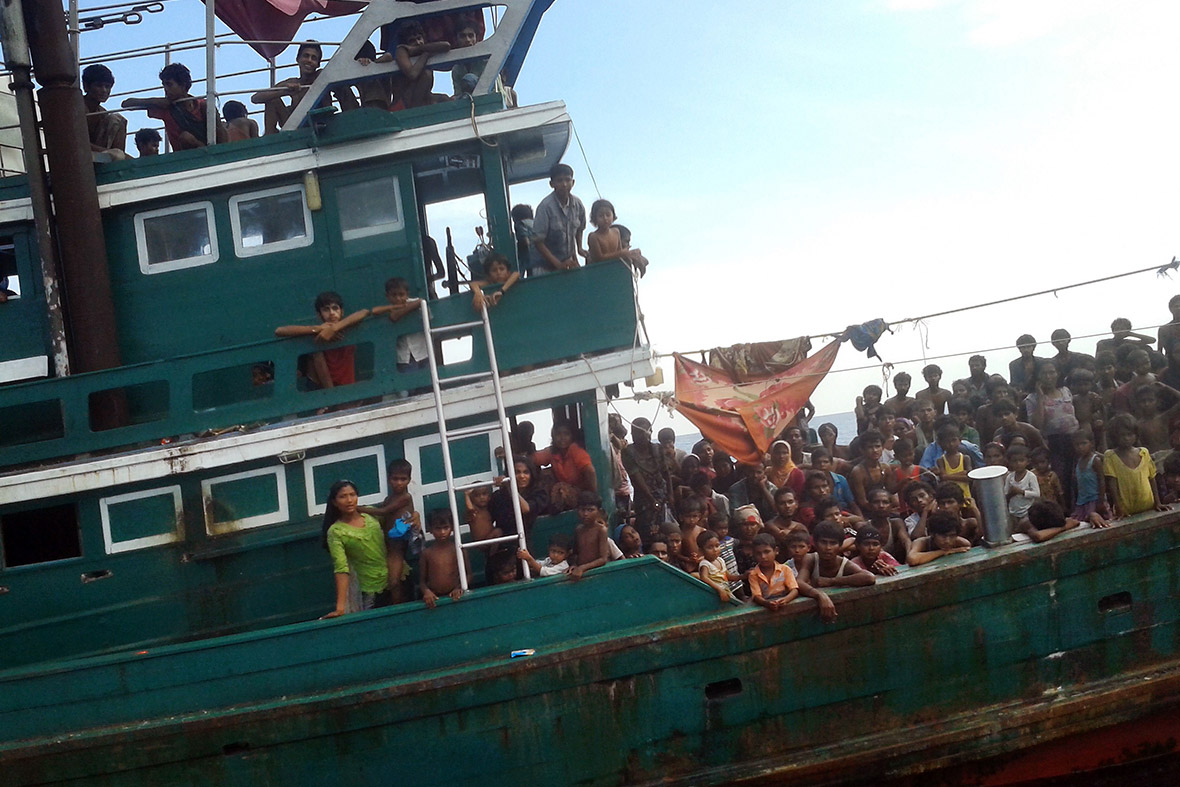 Earlier this week, two boats containing 600 refugees from Burma – mainly Muslim Rohingya – were turned away from the shores of Malaysia, having fled oppression under the Burma Government. They had been at sea for over two months and faced severe dehydration, starvation, and sickness. According to the International Office for Migration, there may be up to 8,000 still stranded at sea, many of whom will perish unless the international community provides urgent and substantive support. The scale of the exodus from Burma is alarming; according to the UN, this year alone more than 25,000 refugees have left Burma and Bangladesh for the shores of Thailand, Indonesia and Malaysia.
Earlier this week, two boats containing 600 refugees from Burma – mainly Muslim Rohingya – were turned away from the shores of Malaysia, having fled oppression under the Burma Government. They had been at sea for over two months and faced severe dehydration, starvation, and sickness. According to the International Office for Migration, there may be up to 8,000 still stranded at sea, many of whom will perish unless the international community provides urgent and substantive support. The scale of the exodus from Burma is alarming; according to the UN, this year alone more than 25,000 refugees have left Burma and Bangladesh for the shores of Thailand, Indonesia and Malaysia.
Many have been identified as Rohingya, Burma’s most persecuted religious minority population. For decades, the Rohingya have been systematically denied citizenship by their oppressive, military-backed government and subjected to repressive and discriminatory legislation, widespread and systematic human rights abuses, and violence that Human Rights Watch has classified as ethnic cleansing. Since 2012, hundreds have died and more than 140,000 have been displaced from their homes and villages. At the very least, the Burma authorities have been criminally negligent as regards the Rohingya; in many cases they were reportedly complicit in the violence. The Burma Government has shown no willingness to even investigate the violence, let alone prosecute those responsible.
• • •Familiar Blocks on the Road to Peace
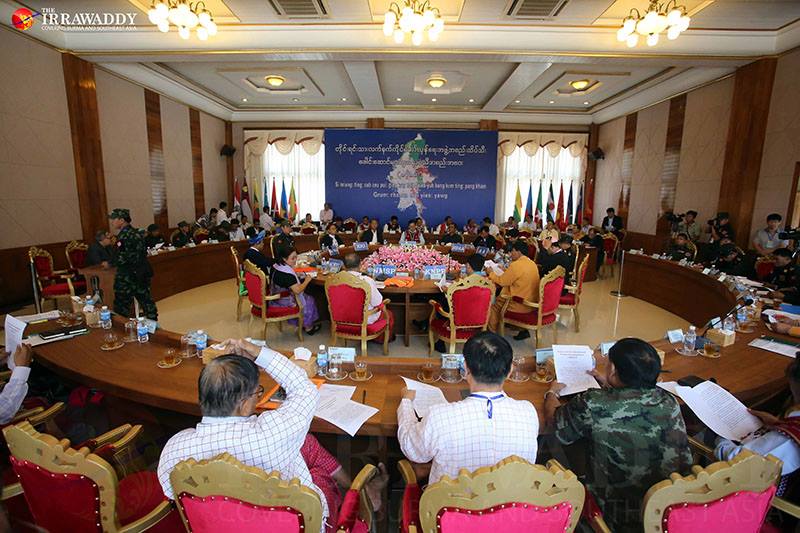 As the ethnic armed groups’ summit in Panghsang, Shan State concluded on 6 May 2015, familiar obstacles still loom large in the peace process. Namely, the 2008 Constitution, continued attacks and human rights violations committed by the Burma Army, and a lack of trust. Various commentators and organizations, including Burma Partnership, sounded words of caution after the over excitement caused by the agreement in principle of the draft nationwide ceasefire agreement (NCA), and those words of caution are salient today as peace remains out of sight.
As the ethnic armed groups’ summit in Panghsang, Shan State concluded on 6 May 2015, familiar obstacles still loom large in the peace process. Namely, the 2008 Constitution, continued attacks and human rights violations committed by the Burma Army, and a lack of trust. Various commentators and organizations, including Burma Partnership, sounded words of caution after the over excitement caused by the agreement in principle of the draft nationwide ceasefire agreement (NCA), and those words of caution are salient today as peace remains out of sight.
The summit in Panghsang, territory controlled by the United Wa State Army (UWSA), brought together 12 major ethnic armed groups for talks that lasted six days. Groups that were present included those bearing the brunt of Burma Army offensives the past few weeks, the Kachin Independence Organization (KIO), the Ta’ang National Liberation Army (TNLA), the Arakan Army (AA), and the Myanmar National Democratic Alliance Army (MNDAA). In fact, as talks were being held, the Burma Army attacked Kachin Independence Army (KIA) positions with airstrikes. It is not just the armed groups themselves who are bearing the brunt of attacks, but horrific human rights violations committed by the Burma Army on fleeing ethnic Kokang villagers, such as extrajudicial killings, including beheadings, are creating deep-seated fear among those who have been displaced by the conflict, but who are being pressured to return by Burma authorities […]
• • •Briefing Paper: Voices of Refugees – Situation of Burma’s Refugees Along the Thailand-Burma Border
(27 April 2015) Today, Burma Link and Burma Partnership launches a joint briefing paper, Voices of Refugees – Situation of Burma’s Refugees Along the Thailand-Burma Border, online. The briefing paper highlights how the voices of refugees continue to be neglected in Burma’s reform process […]
• • •Voices of Refugees – Situation of Burma’s Refugees Along the Thailand-Burma Border
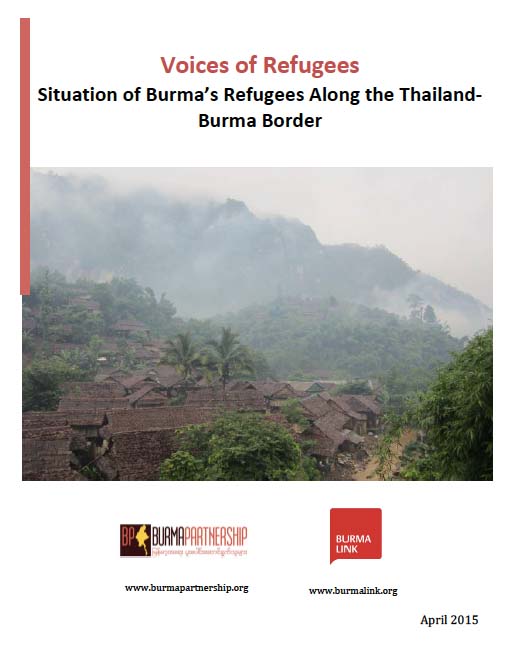 The joint briefing paper by Burma Link and Burma Partnership, Voices of Refugees – Situation of Burma’s Refugees Along the Thailand-Burma Border, which was published online on 27 April 2015, highlights how the voices of refugees continue to be neglected in Burma’s reform process.
The joint briefing paper by Burma Link and Burma Partnership, Voices of Refugees – Situation of Burma’s Refugees Along the Thailand-Burma Border, which was published online on 27 April 2015, highlights how the voices of refugees continue to be neglected in Burma’s reform process.
The briefing paper was initially launched and presented by Soe Aung at the most recently convened Association of Southeast Asian Nations (ASEAN) Civil Society Conference/ASEAN Peoples’ Forum 2015 in Malaysia, which took place between 22-24 April 2015 […]
• • •








 All posts
All posts